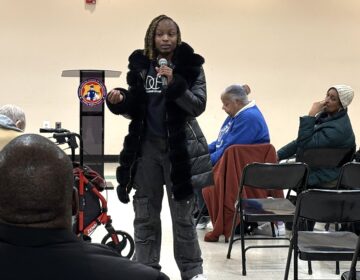Delaware non-profits receive funding to prevent prison recidivism

Part of a multi-million-dollar bank settlement will fund Delaware programs helping individuals re-enter the community after completing prison sentences.
The Delaware Department of Justice and the Delaware Criminal Justice Council is offering a total of $2 million to 18 non-profit organizations serving adult and juvenile ex-offenders.
The funding allocation is the largest state investment in community-based re-entry programs in at least a decade, according to the DOJ.
“Once individuals have served their time we want to make sure they don’t commit new crimes and end up in jail again,” said Attorney General Matt Denn, D-Delaware.
“These folks have served time in our correctional facilities and are going back into the neighborhoods we live in. So anything we can do to reduce the number who commit new crimes is going to make our neighborhoods safer.”
Two thirds of Delaware inmates commit new crimes within three years of release and up to 80 percent of juveniles reoffend, according to the DOJ. Denn said funding for programs that provide resources like job training, counseling and rehousing will provide ex-offenders another path and get the numbers down.
In the past several years, funding for these kinds of programs has been static or reduced, partly due to budget pressures in the state, he said.
The $2 million grant, which was proposed in January 2015, is part of a $36-million settlement the DOJ reached with national banks following misconduct in the financial markets.
The organizations, which went through a competitive grant process, will receive funding ranging from $11,495 to $150,000, with established organizations receiving the largest number of funds. The CJC, which received applications, will monitor the organizations to ensure the grant funds are spent appropriately.
The grants, which are one or two year one-time awards, also will help organizations when reaching out to donors, Denn said.
The Delaware Financial Literacy Institute received $141,657 to expand its financial education and entrepreneurship programs to prisons statewide.
“There’s such a high rate of re-offending, and many of those incidents are because of lack of knowledge of money, lack of a job, so we would like to provide resources to make reentry into the community and back to the family more successful,” said Ronni Cohen, executive director of the organization.
Brandywine Counseling and Community Services is receiving $150,000 for a new program that will serve 50 juveniles a year who are preparing for release from juvenile detention facilities, and are considered high risk to re-offend.
A case worker will work with juveniles 30 days prior to release, and continue working with them after release to ensure they’re re-enrolled in school, receive job training and opportunities, and appropriate health care.
“Brandywine’s committed to folks who need a second chance,” said CEO Lynn Fahey.
She said the wrap-around services will tackle some of the key issues this population faces and prepare them for success.
“They face all kinds of issues between poverty, and some gang involvement, mental health trauma, many have been exposed to traumatic events in childhood and have not had the opportunity to work through that trauma, depression and anxiety, and potentially a substance abuse disorder could be thrown in there as well,” Fahey said.
The Hope Commission, which provides resources to men released from prison who are considered high-risk to reoffend, is receiving $150,000. The grant will be used to hire additional staff to work with the men prior to their release. The organizations executive director Charles Madden said intervening sooner will increase their success rate.
“While they’re incarcerated they’re a much more captive audience. There’s fewer distractions in their life while they’re incarcerated,” he said. “The minute they come back to the community, there’s certainly a lot of distractions, with trying to catch up for lost time with families, trying to find work, stable housing—any barriers that exist you’re competing against that.”
Project New Start is receiving $141,657 to sustain its 11-week program that offers technology training, job training, financial literacy education and an alternative to violence project. Executive Director Priscilla Turgon said her organization lost funding this year.
“It’s really going to save us this year,” she said. “It’s a Godsend, because it will help us sustain the program.”
WHYY is your source for fact-based, in-depth journalism and information. As a nonprofit organization, we rely on financial support from readers like you. Please give today.





